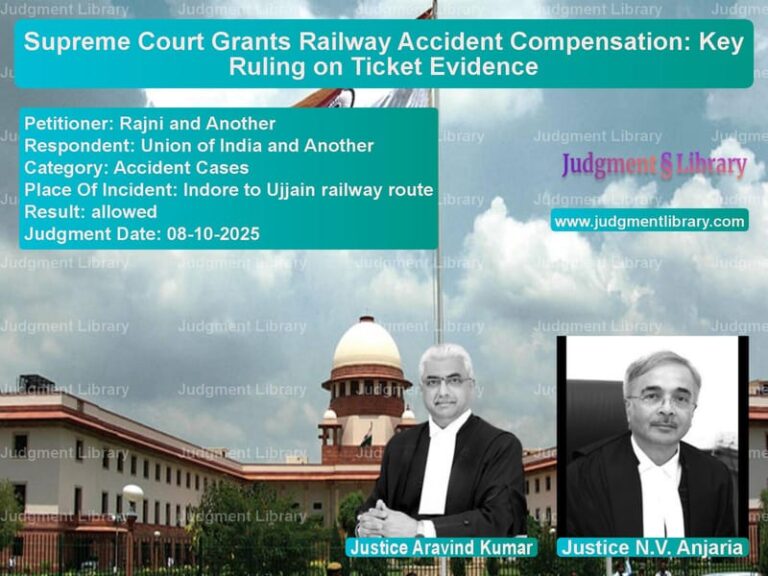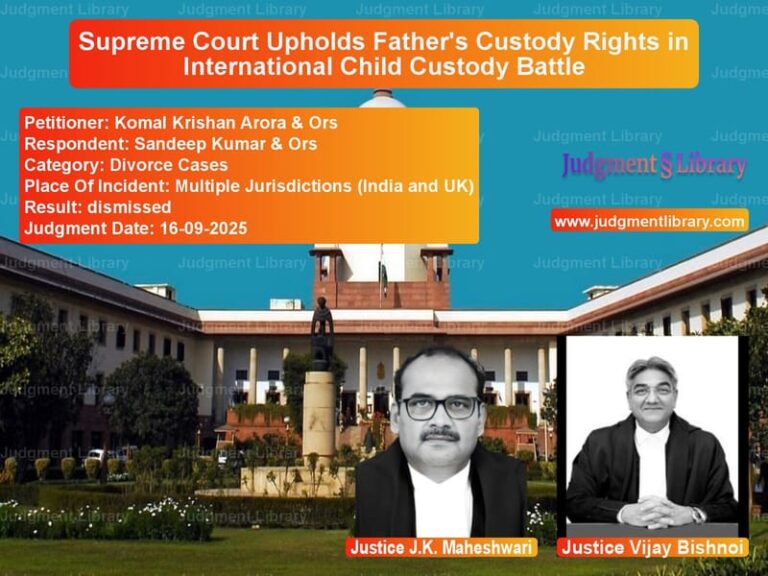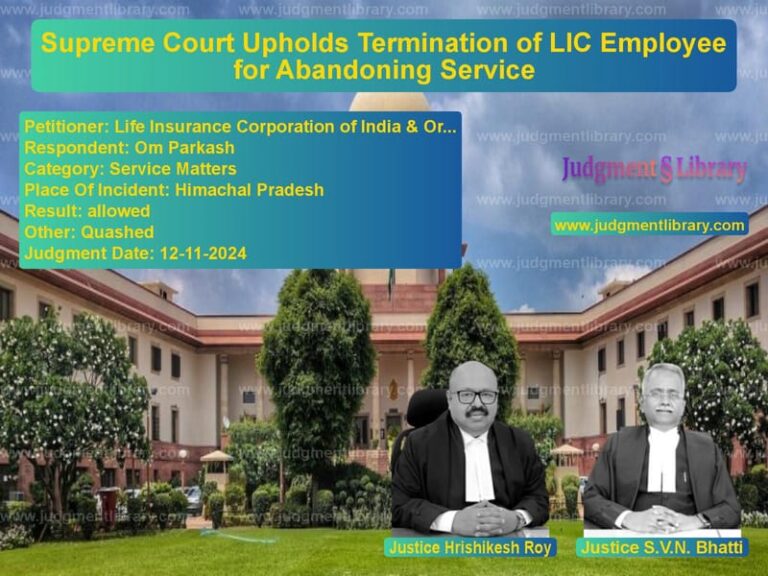Fraudulent Real Estate Investment and Criminal Proceedings: Supreme Court’s Landmark Ruling
The Supreme Court of India recently delivered a crucial ruling in the case of M Tech Developers Pvt. Ltd. v. State of NCT of Delhi & Ors., which dealt with allegations of fraudulent real estate transactions. This case is significant because it clarifies the legal principles governing criminal complaints in real estate fraud and the circumstances under which courts can quash such complaints at the preliminary stage.
Background of the Case
The petitioner, M Tech Developers Pvt. Ltd., was accused of fraudulent dealings in a real estate project. The complainant alleged that the petitioner had misrepresented the investment opportunities and induced buyers under false pretenses, leading to significant financial losses.
Key facts:
- The complainant invested a substantial sum in a real estate project marketed by M Tech Developers Pvt. Ltd.
- The company allegedly promised high returns and early possession of property, which did not materialize.
- The complainant alleged that the funds collected were diverted for other purposes.
- A criminal complaint was filed under Sections 406 (Criminal Breach of Trust), 420 (Cheating), and 120B (Criminal Conspiracy) of the Indian Penal Code (IPC).
- The accused approached the Delhi High Court to quash the complaint.
Arguments by the Petitioner (M Tech Developers Pvt. Ltd.)
The petitioner contended:
- The dispute was civil in nature and should not have been converted into a criminal complaint.
- The complainant had voluntarily entered into the investment and was aware of the associated risks.
- There was no intention to cheat, and the delays in project completion were due to unforeseen market conditions.
- The allegations lacked sufficient evidence to justify a criminal trial.
Arguments by the Respondents (State of NCT of Delhi & Complainant)
The respondents argued:
- The real estate firm induced investors with false promises, knowing that the project was unviable.
- The funds collected were not used for the intended purpose, amounting to criminal misappropriation.
- The case involved criminal fraud, and civil remedies were inadequate to address the grievance.
- The High Court should not interfere at the preliminary stage when the allegations disclosed a cognizable offense.
Delhi High Court’s Decision
The Delhi High Court ruled against the petitioner, stating that:
- The allegations in the complaint disclosed a prima facie case.
- The matter required a thorough investigation and could not be quashed without examining evidence.
- The role of the company and its directors in misleading investors had to be scrutinized by the trial court.
Supreme Court’s Verdict
The Supreme Court upheld the High Court’s decision and dismissed the Special Leave Petition filed by M Tech Developers Pvt. Ltd. The Court made key observations:
On the Role of the High Court in Quashing Criminal Complaints
“The High Court was correct in refusing to quash the criminal proceedings at the threshold. When allegations disclose a cognizable offense, courts should refrain from interfering at the preliminary stage.”
On the Nature of the Dispute
The Supreme Court rejected the argument that the dispute was purely civil:
“Merely because a transaction involves a commercial element does not preclude the commission of a criminal offense. If there is fraudulent intent from the beginning, the aggrieved party has the right to seek criminal remedies.”
On the Magistrate’s Responsibility
The Supreme Court directed the Magistrate to conclude the proceedings within six months, stating:
“The concerned Magistrate must decide the complaint in accordance with the law within six months from today.”
Key Legal Principles Established
- Judicial Restraint in Quashing Criminal Complaints: Courts should not interfere at the preliminary stage if allegations suggest a prima facie offense.
- Fraud in Commercial Transactions: A business dispute does not automatically preclude criminal liability if deception is evident.
- Expedited Criminal Proceedings: The Supreme Court’s direction ensures swift justice for victims of financial fraud.
Implications of the Judgment
This ruling has broad implications for real estate investors and developers:
- Investors have stronger legal recourse against fraudulent developers.
- Developers must ensure transparency in financial dealings to avoid criminal liability.
- Trial courts must expedite proceedings to prevent undue delays.
Conclusion
The Supreme Court’s ruling reinforces the need for due diligence in real estate investments and ensures that fraud victims can seek criminal remedies. By upholding the right to a fair trial, the decision strengthens investor protections and promotes accountability in the real estate sector.
Petitioner Name: M Tech Developers Pvt. Ltd..Respondent Name: State of NCT of Delhi & Ors..Judgment By: Justice Abhay Manohar Sapre, Justice Indu Malhotra.Place Of Incident: Delhi.Judgment Date: 30-07-2019.
Don’t miss out on the full details! Download the complete judgment in PDF format below and gain valuable insights instantly!
Download Judgment: M Tech Developers Pv vs State of NCT of Delh Supreme Court of India Judgment Dated 30-07-2019.pdf
Direct Downlaod Judgment: Direct downlaod this Judgment
See all petitions in Fraud and Forgery
See all petitions in Bail and Anticipatory Bail
See all petitions in Corporate Compliance
See all petitions in Property Disputes
See all petitions in Judgment by Abhay Manohar Sapre
See all petitions in Judgment by Indu Malhotra
See all petitions in dismissed
See all petitions in supreme court of India judgments July 2019
See all petitions in 2019 judgments
See all posts in Criminal Cases Category
See all allowed petitions in Criminal Cases Category
See all Dismissed petitions in Criminal Cases Category
See all partially allowed petitions in Criminal Cases Category







